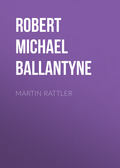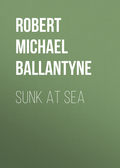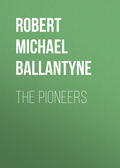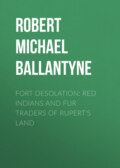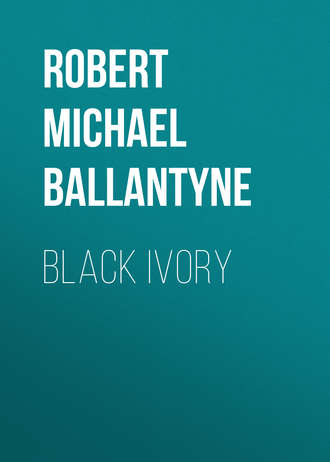
Robert Michael Ballantyne
Black Ivory
Chapter Nineteen.
Tells of Misfortunes that Befell Our Wanderers; of Familiar Toys Under New Aspects, Etcetera
When Harold Seadrift and Disco Lillihammer were stopped in their journey, as related in a former chapter, by the sudden illness of the bold seaman, an event was impending over them which effectually overturned their plans. This was the sudden descent of a band of armed natives who had been recently driven from their homes by a slaving party. The slavers had taken them by surprise during the night, set their huts on fire, captured their women and children, and slaughtered all the men, excepting those who sought and found safety in flight. It was those who had thus escaped that chanced to come upon the camp of our travellers one evening about sunset.
Disco was recovering from his attack of fever at the time, though still weak. Harold was sitting by his couch of leaves in the hut which had been erected for him on the first day of the illness. Jumbo was cutting up a piece of flesh for supper, and Antonio was putting the kettle on the fire. The rest of the party were away in the woods hunting.
No guard was kept; consequently the savages came down on them like a thunderbolt, and found them quite unprepared to resist even if resistance had been of any use.
At first their captors, bitterly infuriated by their recent losses, proposed to kill their prisoners, without delay, by means of the most excruciating tortures that they could invent, but from some unknown cause, changed their minds; coupled Harold and Disco together by means of two slave-sticks; tied Antonio and Jumbo with ropes, and drove them away.
So suddenly was the thing done, and so effectually, that Disco was far from the camp before he could realise that what had occurred was a fact, and not one of the wild feverish dreams that had beset him during his illness.
The natives would not listen to the earnest explanation of Antonio that Harold and Disco were Englishmen, and haters of slavery. They scowled as they replied that the same had been said by the slavers who had attacked their village; from which remark it would seem that Yoosoof was not quite the originator of that device to throw the natives off their guard. The Portuguese of Tette on the Zambesi had also thought of and acted on it!
Fortunately it was, as we have said, near sunset when the capture was made, and before it became quite dark the band encamped, else must poor Disco have succumbed to weakness and fatigue. The very desperation of his circumstances, however, seemed to revive his strength, for next morning he resumed his journey with some hope of being able to hold out. The continued protestations and assurances of Antonio, also, had the effect of inducing their captors to remove the heavy slave-sticks from the necks of Harold and Disco, though they did not unbind their wrists. Thus were they led further into the country, they knew not whither, for several days and nights, and at last reached a large village where they were all thrust into a hut, and left to their meditations, while their captors went to palaver with the chief man of the place.
This chief proved to be a further-sighted man than the men of the tribe who had captured the Englishmen. His name was Yambo. He had heard of Dr Livingstone, and had met with men of other tribes who had seen and conversed with the great traveller. Thus, being of a thoughtful and inquiring disposition, he had come to understand enough of the good white man’s sentiments to guard him from being imposed on by pretended Christians.
Yambo’s name signified “how are you?” and was probably bestowed on him because of a strongly benevolent tendency to greet friend and stranger alike with a hearty “how d’ee do?” sort of expression of face and tone of voice.
He was a tall grave man, with a commanding firm look, and, withal, a dash of child-like humour and simplicity. On hearing his visitors’ remarks about their captives, he at once paid them a visit and a few leading questions put to Harold through Antonio convinced him that the prisoners were true men. He therefore returned to his black visitors, told them that he had perfect confidence in the good faith of the white men, and said that he meant to take charge of them. He then entertained his black brothers hospitably, gave them a few presents, and sent them on their way. This done he returned to his guests and told them that they were free, that their captors were gone, and that they might go where they pleased, but that it would gratify him much if they would consent to spend some time hunting with him in the neighbourhood of his village.
“Now,” said Disco, after Yambo left them, “this is wot I call the most uncommon fix that ever wos got into by man since Adam an’ Eve began housekeepin’ in the garden of Eden.”
“I’m not quite sure,” replied Harold, with a rueful look, “that it is absolutely the worst fix, but it is bad enough. The worst of it is that this Yambo has let these rascals off with all our fire-arms and camp-equipage, so that we are absolutely helpless—might as well be prisoners, for we can’t quit this village in such circumstances.”
“Wot’s wuss than that to my mind, sir, is, that here we are at sea, in the heart of Afriky, without chart, quadrant, compass, or rudder, an’ no more idea of our whereabouts than one o’ them spider monkeys that grins among the trees. Hows’ever, we’re in luck to fall into the hands of a friendly chief, so, like these same monkeys, we must grin an’ bear it; only I can’t help feelin’ a bit cast down at the loss of our messmates. I fear there’s no chance of their findin’ us.”
“Not the least chance in the world, I should say,” returned Harold. “They could not guess in which direction we had gone, and unless they had hit on the right road at first, every step they took afterwards would only widen the distance between us.”
“It’s lucky I was beginnin’ to mend before we was catched,” said Disco, feeling the muscles of his legs; “true, I ain’t much to boast of yet but I’m improvin’.”
“That is more than I can say for myself,” returned Harold, with a sigh, as he passed his hand across his forehead; “I feel as if this last push through the woods in the hot sun, and the weight of that terrible slave-stick had been almost too much for me.”
Disco looked earnestly and anxiously into the face of his friend.
“Wot,” asked he, “does you feel?”
“I can scarcely tell,” replied Harold, with a faint smile. “Oh, I suppose I’m a little knocked up, that’s all. A night’s rest will put me all right.”
“So I thought myself, but I wos wrong,” said Disco. “Let’s hear wot your feelin’s is, sir; I’m as good as any doctor now, I am, in regard to symptoms.”
“Well, I feel a sort of all-overishness, a kind of lassitude and sleepiness, with a slight headache, and a dull pain which appears to be creeping up my spine.”
“You’re in for it sir,” said Disco. “It’s lucky you have always carried the physic in your pockets, ’cause you’ll need it, an’ it’s lucky, too, that I am here and well enough to return tit for tat and nurse you, ’cause you’ll have that ’ere pain in your spine creep up your back and round your ribs till it lays hold of yer shoulders, where it’ll stick as if it had made up its mind to stay there for ever an’ a day. Arter that you’ll get cold an’ shivering like ice—oh! doesn’t I know it well—an’ then hot as fire, with heavy head, an’ swimming eyes, an’ twisted sight, an’ confusion of—”
“Hold! hold!” cried Harold, laughing, “if you go on in that way I shall have more than my fair share of it! Pray stop, and leave me a little to find out for myself.”
“Well, sir, take a purge, and turn in at once, that’s my advice. I’ll dose you with quinine to-morrow mornin’, first thing,” said Disco, rising and proceeding forthwith to arrange a couch in a corner of the hut, which Yambo had assigned them.
Harold knew well enough that his follower was right. He took his advice without delay, and next morning found himself little better than a child, both physically and mentally, for the disease not only prostrated his great strength—as it had that of his equally robust companion—but, at a certain stage, induced delirium, during which he talked the most ineffable nonsense that his tongue could pronounce, or his brain conceive.
Poor Disco, who, of course, had been unable to appreciate the extent of his own delirious condition, began to fear that his leader’s mind was gone for ever, and Jumbo was so depressed by the unutterably solemn expression of the mariner’s once jovial countenance, that he did not once show his teeth for a whole week, save when engaged with meals.
As for Antonio, his nature not being very sympathetic, and his health being good, he rather enjoyed the quiet life and good living which characterised the native village, and secretly hoped that Harold might remain on the sick-list for a considerable time to come.
How long this state of affairs lasted we cannot tell, for both Harold and Disco lost the correct record of time during their respective illnesses.
Up to that period they had remembered the days of the week, in consequence of their habit of refraining from going out to hunt on Sundays, except when a dearth of meat in the larder rendered hunting a necessity. Upon these Sundays Harold’s conscience sometimes reproached him for having set out on his journey into Africa without a Bible. He whispered, to himself at first, and afterwards suggested to Disco, the excuse that his Bible had been lost in the wreck of his father’s vessel, and that, perhaps, there were no Bibles to be purchased in Zanzibar, but his conscience was a troublesome one, and refused to tolerate such bad reasoning, reminding him, reproachfully, that he had made no effort whatever to obtain a Bible at Zanzibar.
As time had passed, and some of the horrors of the slave-trade had been brought under his notice, many of the words of Scripture leaped to his remembrance, and the regret that he had not carried a copy with him increased. That touch of thoughtlessness, so natural to the young and healthy—to whom life has so far been only a garden of roses—was utterly routed by the stern and dreadful realities which had been recently enacted around him, and just in proportion as he was impressed with the lies, tyranny, cruelty, and falsehood of man, so did his thoughtful regard for the truth and the love of God increase, especially those truths that were most directly opposed to the traffic in human flesh, such as—“love your enemies,” “seek peace with all men,” “be kindly affectioned one to another,” “whatsoever ye would that men should do unto you, do ye even so to them.” An absolute infidel, he thought, could not fail to perceive that a most blessed change would come over the face of Africa if such principles prevailed among its inhabitants, even in an extremely moderate degree.
But to return, the unfortunate travellers were now “at sea” altogether in regard to the Sabbath as well as the day of the month. Indeed their minds were not very clear as to the month itself!
“Hows’ever,” said Disco, when this subject afterwards came to be discussed, “it don’t matter much. Wot is it that the Scriptur’ says,—‘Six days shalt thou labour an’ do all that thou hast to do, but the seventh day is the Sabbath of the Lord thy God. In it thou shalt do no work.’ I wos used always to stick at that pint w’en my poor mother was a-teachin’ of me. Never got past it. But it’s enough for present use anyhow, for the orders is, work six days an’ don’t work the seventh. Werry good, we’ll begin to-day an’ call it Monday; we’ll work for six days, an’ w’en the seventh day comes we’ll call it Sunday. If it ain’t the right day, we can’t help it; moreover, wot’s the odds? It’s the seventh day, so that to us it’ll be the Sabbath.”
But we anticipate. Harold was still—at the beginning of this digression—in the delirium of fever, though there were symptoms of improvement about him.
One afternoon one of these symptoms was strongly manifested in a long, profound slumber. While he slept Disco sat on a low stool beside him, busily engaged with a clasp-knife on some species of manufacture, the nature of which was not apparent at a glance.
His admirer, Jumbo, was seated on a stool opposite, gazing at him open-mouthed, with a countenance that reflected every passing feeling of his dusky bosom.
Both men were so deeply absorbed in their occupation—Disco in his manufacture, and Jumbo in staring at Disco—that they failed for a considerable time to observe that Harold had wakened suddenly, though quietly, and was gazing at them with a look of lazy, easy-going surprise.
The mariner kept up a running commentary on his work, addressed to Jumbo indeed, but in a quiet interjectional manner that seemed to imply that he was merely soliloquising, and did not want or expect a reply.
“It’s the most ’stror’nary notion, Jumbo, between you and me and the post, that I ever did see. Now, then, this here bullet-head wants a pair o’ eyes an’ a nose on it; the mouth’ll do, but it’s the mouth as is most troublesome, for you niggers have got such wappin’ muzzles—it’s quite a caution, as the Yankees say,”—(a pause)—“on the whole, however, the nose is very difficult to manage on a flat surface, ’cause w’y?—if I leaves it quite flat, it don’t look like a nose, an’ if I carves it out ever so little, it’s too prominent for a nigger nose. There, ain’t that a good head, Jumbo?”
Thus directly appealed to, Jumbo nodded his own head violently, and showed his magnificent teeth from ear to ear, gums included.
Disco laid down the flat piece of board which he had carved into the form of a human head, and took up another piece, which was rudely blocked out into the form of a human leg—both leg and head being as large as life.
“Now this limb, Jumbo,” continued Disco, slowly, as he whittled away with the clasp-knife vigorously, “is much more troublesome than I would have expected; for you niggers have got such abominably ill-shaped legs below the knee. There’s such an unnat’ral bend for’ard o’ the shin-bone, an’ such a rediklous sticking out o’ the heel astarn, d’ee see, that a feller with white man notions has to make a study of it, if he sets up for a artist; in course, if he don’t set up for a artist any sort o’ shape’ll do, for it don’t affect the jumpin’. Ha! there they go,” he exclaimed, with a humorous smile at a hearty shout of laughter which was heard just outside the hut, “enjoyin’ the old ’un; but it’s nothin’ to wot the noo ’un’ll be w’en it’s finished.”
At this exhibition of amusement on the countenance of his friend, Jumbo threw back his head and again showed not only his teeth and gums but the entire inside of his mouth, and chuckled softly from the region of his breast-bone.
“I’m dreaming, of course,” thought Harold, and shut his eyes.
Poor fellow! he was very weak, and the mere act of shutting his eyes induced a half-slumber. He awoke again in a few minutes, and re-opening his eyes, beheld the two men still sitting, and occupied as before.
“It is a wonderfully pertinacious dream,” thought Harold. “I’ll try to dissipate it.”
Thinking thus, he called out aloud,—“I say, Disco!”
“Hallo! that’s uncommon like the old tones,” exclaimed the seaman, dropping his knife and the leg of wood as he looked anxiously at his friend.
“What old tones?” asked Harold.
“The tones of your voice,” said Disco.
“Have they changed so much of late?” inquired Harold in surprise.
“Have they? I should think they have, just. W’y, you haven’t spoke like that, sir, for—but, surely—are you better, or is this on’y another dodge o’ yer madness?” asked Disco with a troubled look.
“Ah! I suppose I’ve been delirious, have I?” said Harold with a faint smile.
To this Disco replied that he had not only been delirious, but stark staring mad, and expressed a very earnest hope that, now he had got his senses hauled taut again, he’d belay them an’ make all fast for, if he didn’t, it was his, Disco’s opinion, that another breeze o’ the same kind would blow ’em all to ribbons.
“Moreover,” continued Disco, firmly, “you’re not to talk. I once nursed a messmate through a fever, an’ I remember that the doctor wos werry partikler w’en he began to come round, in orderin’ him to hold his tongue an’ keep quiet.”
“You are right Disco. I will keep quiet, but you must first tell me what you are about, for it has roused my curiosity, and I can’t rest till I know.”
“Well, sir, I’ll tell you, but don’t go for to make no obsarvations on it. Just keep your mouth shut an’ yer ears open, an’ I’ll do all the jawin’. Well, you must know, soon after you wos took bad, I felt as if I’d like some sort o’ okipation w’en sittin’ here watchin’ of you—Jumbo an’ me’s bin takin’ the watch time about, for Antony isn’t able to hold a boy, much less you w’en you gits obstropolous—Well, sir, I had took a sort o’ fancy for Yambo’s youngest boy, for he’s a fine, brave little shaver, he is, an’ I thought I’d make him some sort o’ toy, an’ it struck me that the thing as ’ud please him most ’ud be a jumpin’-jack, so I set to an’ made him one about a futt high.
“You never see such a face o’ joy as that youngster put on, sir, w’en I took it to him an’ pulled the string. He give a little squeak of delight he did, tuk it in his hands, an’ ran home to show it to his mother. Well, sir, wot d’ee think, the poor boy come back soon after, blubberin’ an’ sobbin’, as nat’ral as if he’d bin an English boy, an’ says he to Tony, says he, ‘Father’s bin an’ took it away from me!’ I wos surprised at this, an’ went right off to see about it, an’ w’en I come to Yambo’s hut wot does I see but the chief pullin’ the string o’ the jumpin’-jack, an’ grinnin’ an’ sniggerin’ like a blue-faced baboon in a passion—his wife likewise standin’ by holdin’ her sides wi’ laughin’. Well, sir, the moment I goes in, up gits the chief an’ shouts for Tony, an’ tells him to tell me that I must make him a jumpin’-jack! In course I says I’d do it with all the pleasure in life; and he says that I must make it full size, as big as hisself! I opened my eyes at this, but he said he must have a thing that was fit for a man—a chief—so there was nothin’ for it but to set to work. An’ it worn’t difficult to manage neither, for they supplied me with slabs o’ timber an inch thick an’ I soon blocked out the body an’ limbs with a hatchet an’ polished ’em off with my knife, and then put ’em together. W’en the big jack wos all right Yambo took it away, for he’d watched me all the time I wos at it, an’ fixed it up to the branch of a tree an’ set to work.
“I never, no I never, did,” continued Disco, slapping his right thigh, while Jumbo grinned in sympathy, “see sitch a big baby as Yambo became w’en he got that monstrous jumpin’-jack into action—with his courtiers all round him, their faces blazin’ with surprise, or conwulsed wi’ laughter. The chief hisself was too hard at work to laugh much. He could only glare an’ grin, for, big an’ strong though he is, the jack wos so awful heavy that it took all his weight an’ muscle haulin’ on the rope which okipied the place o’ the string that we’re used to.
“‘Haul away, my hearty,’ thought I, w’en I seed him heavin’, blowin’, an’ swettin’ at the jack’s halyards, ‘you’ll not break that rope in a hurry.’
“But I was wrong, sir, for, although the halyards held on all right, I had not calkilated on such wiolent action at the joints. All of a sudden off comes a leg at the knee. It was goin’ the up’ard kick at the time, an’ went up like a rocket, slap through a troop o’ monkeys that was lookin’ on aloft, which it scattered like foam in a gale. Yambo didn’t seem to care a pinch o’ snuff. His blood was up. The sweat was runnin’ off him like rain. ‘Hi!’ cries he, givin’ another most awful tug. But it wasn’t high that time, for the other leg came off at the hip-jint on the down kick, an’ went straight into the buzzum of a black warrior an’ floored him wuss than he ever wos floored since he took to fightin’. Yambo didn’t care for that either. He gave another haul with all his might, which proved too much for jack without his legs, for it threw his arms out with such force that they jammed hard an’ fast, as if the poor critter was howlin’ for mercy!
“Yambo looked awful blank at this. Then he turned sharp round and looked at me for all the world as if he meant to say ‘wot d’ee mean by that? eh!’
“‘He shouldn’t ought to lick into him like that,’ says I to Tony, ‘the figure ain’t made to be druv by a six-horse power steam-engine! But tell him I’ll fix it up with jints that’ll stand pullin’ by an elephant, and I’ll make him another jack to the full as big as that one an’ twice as strong.’
“This,” added Disco in conclusion, taking up the head on which he had been engaged, “is the noo jack. The old un’s outside working away at this moment like a win’-mill. Listen; don’t ’ee hear ’em?”
Harold listened and found no difficulty in hearing them, for peals of laughter and shrieks of delight burst forth every few minutes, apparently from a vast crowd outside the hut.
“I do believe,” said Disco, rising and going towards the door of the hut “that you can see ’em from where you lay.”
He drew aside the skin doorway as he spoke, and there, sure enough, was the gigantic jumping-jack hanging from the limb of a tree, clearly defined against the sky, and galvanically kicking about its vast limbs, with Yambo pulling fiercely at the tail, and the entire tribe looking on steeped in ecstasy and admiration.
It may easily be believed that the sight of this, coupled with Disco’s narrative, was almost too much for Harold’s nerves, and for some time he exhibited, to Disco’s horror, a tendency to repeat some antics which would have been much more appropriate to the jumping-jack, but, after a warm drink administered by his faithful though rough nurse, he became composed, and finally dropped into a pleasant sleep, which was not broken till late the following morning.
Refreshed in body, happy in mind, and thankful in spirit he rose to feel that the illness against which he had fought for many days was conquered, and that, although still very weak, he had fairly turned the corner, and had begun to regain some of his wonted health and vigour.



